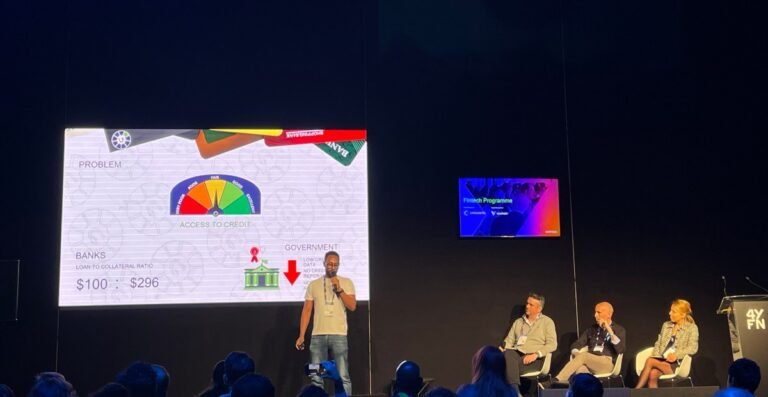
Ethiopian startup eQub is the winner of the fintech pitch-off at 4YFN 2024, Mobile World Congress’ startup event.
The startup’s name is an Amharic word referring to a local form of peer-to-peer credit, Michael said.
An Equb is a group of people who join forces to save money, which is then distributed on a rotating basis.
Starting with an app, it targets users among the growing number of Ethiopians who have bank accounts and mobile phones, but limited access to credit.
Making an Equb digital is an improvement in itself: For eQub members with bank accounts, they can add money without having to go to an ATM.

The payment landscape in the Middle East and Africa (MEA) region is marked by significant fragmentation, with numerous payment providers and methods in each country, evolving regulations and diverse customer preferences.
This complexity is further compounded by challenges such as payment fraud, low checkout conversion rates, and high transaction failure rates.
Payment orchestration platforms streamline payment processes for merchants through unified payment APIs.
As merchants or companies launch their platforms, they often start by collaborating with one or two payment processing providers.
As their operations grow and expand into multiple regions, they onboard additional payment providers to meet their evolving needs.

Google is sunsetting the Google Pay app in the US later this yearGoogle has announced that Google Pay is shutting down in the United States in June, as the standalone app has largely been replaced by Google Wallet.
Users can continue to access the app’s most popular features right from Google Wallet, which Google says is used five times more than the Google Pay app in the United States.
After June 4, users will no longer be able to send, request or receive money through the U.S. version of the Google Pay app.
Users who used the Google Pay app to find offers and deals can still so do using the new deals destination on Google Search, the company says.
Google says millions of people in over 180 countries use Google Pay to check out when shopping on desktop, mobile and in store.

Investing app Grifin today officially launched its anticipated investing model called “Adaptive Investing,” which enables you to automatically invest in your favorite brands that you frequently shop from.
“Investing, and even having a healthy positive relationship with money, is an incredibly difficult thing to do and achieve,” co-founder Aaron Froug tells TechCrunch.
It also introduces a “Secret Cash” function, allowing for non-public purchases and putting more money away as cash for their future.
“I’ve been personally using our app for a little over two years and I’ve invested in 115 unique companies,” he notes.
Additionally, Grifin is planning a redesign of its app, which will include a premium version as well as an AI chatbot to help people learn how to invest.

In the latest development, three-year-old Hohm Energy, which connects homeowners and businesses with accredited solar installers, product suppliers, and embedded solar finance in South Africa, has raised $8 million in seed investment.
The funding, whose first tranche of $4.25 million came in Q4 2022, is the largest seed round for a tech startup in South Africa, according to Hohm Energy.
Hohm Energy says its solution was built as an alternative and sustainable energy source for over 7 million addressable households connected to South Africa’s national grid.
Hohm Energy would then generate a final engineering proposal and present it to its banking partners for financing approval.
“We are thrilled to announce our inaugural investment in Hohm Energy.

In a role reversal, Xalts, a Singapore fintech startup founded 18 months ago, has acquired Contour Network, a digital trade platform set up by eight major banks including HSBC, Standard Chartered and BNP.
Backed by Accel and Citi Ventures, Xalts enables financial institutions to build and manage blockchain-based apps.
The startup plans to turn Contour into a rail connecting banks, corporations and other institutions, and integrate it with Xalts’ platform.
Kaur says this will enable Xalts’ clients to not only build apps, but also connect with each other in a secure and compliant way.
It will focus first on enabling banks and logistics companies to offer embedded trade and supply chain apps on a single platform to their customers.

This week, we’re looking at a new finance-based dating app, Robinhood’s earnings results and the startup in which PayPal Ventures made its first investment.
Launched by financial platform Neon Money Club, Score is a dating app for people with good to excellent credit, and it seeks to help raise awareness about the importance of finances in relationships.
Dollars and centsFinom, a European challenger bank aimed at SMEs and freelancers, has raised €50 million ($54 million) in a Series B equity round of funding.
Rasa, an enterprise-focused conversational generative AI platform with financial services companies as clients, raised $30 million in a Series C round co-led by StepStone Capital and PayPal Ventures.
Cash App announced it will now offer “up to” a 4.5% APY (annual percentage yield) for its Cash App Savings customers, with a few caveats.

Why are ransomware gangs making so much money?
2023 was a lucrative year for ransomware gangs, fueled by an escalation in threats and tacticsFor many organizations and startups, 2023 was a rough year financially, with companies struggling to raise money and others making cuts to survive.
While 2023 was overall a bumper year for ransomware gangs, other hacker-watchers observed a drop in payments toward the end of the year.
Record-breaking ransomsWhile more ransomware victims are refusing to line the pockets of hackers, ransomware gangs are compensating for this drop in earnings by increasing the number of victims they target.
The company also predicts that a ransom payments ban would lead to the overnight creation of a large illegal market for facilitating ransomware payments.

It’s a story as old as time: Startup founder raises giant sack of that sweet, sweet VC money.
If you throw enough money at advertising, anyone can get the growth chart to go up and to the right.
But the thing is, you need to find the right way to do growth, and that’s a lot harder.
In his new book, “Growth Levers and How to Find Them,” he makes a case for finding the right way to sell your product.
And that actually worked.

In this edition, I’m going to look at Brex’s latest round of layoffs, the state of fintech investing in 2023 and more!
I may be taking some time off in coming weeks but never fear, TechCrunch Fintech isn’t going away.
While interest rates were low, the company saw a bump in business and VC money was easier to come by.
The move came after reports the company burned $17 million in cash each month during the fourth quarter and that it is trying to preserve runway.
Fintech investors injected $34.6 billion in startups across 2,055 deals in 2023, a –43.8% and –32.4% YoY drop, respectively, according to PitchBook data.













